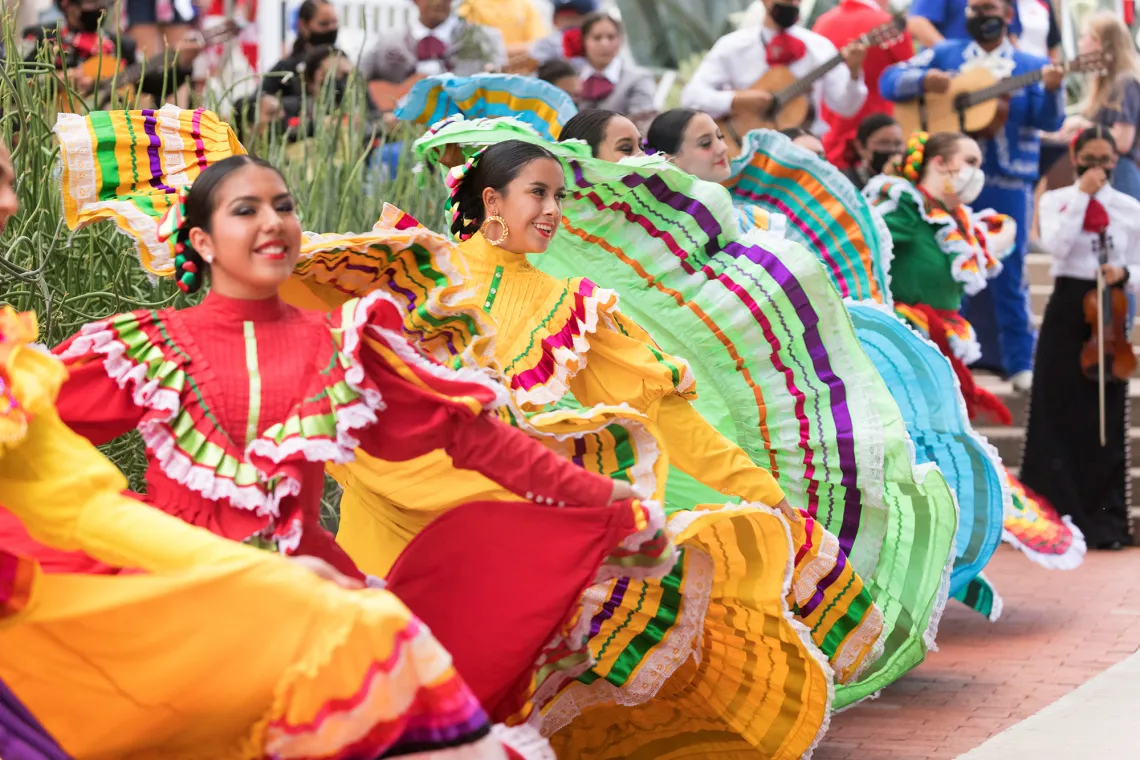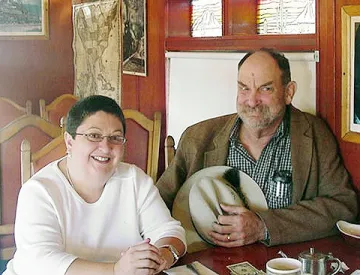Bringing People Together

Maribel Alvarez ’03 talks about the importance of folklife with an infectious passion and warmth. “I wish people would abandon the notion that folklore is a relic of the past. It is our everyday,” she says. Alvarez, the Jim Griffith Chair in Public Folklore at the Southwest Center in the College of Social and Behavioral Sciences, describes folklife as the grease that oils the machine of everyday life and makes it endurable.
She received her doctorate in anthropology from the University of Arizona in 2003. In addition to holding the Jim Griffith Chair, she is an associate research professor and associate dean for community engagement in SBS and serves as the interim associate vice provost of diversity and inclusion.
“I write, I teach, I have a Ph.D. — but I’m also a cultural producer,” Alvarez says. Her title as public folklorist is significant because although she is a scholar, her primary focus is public education, events and programming. This emphasis on public engagement, she says, fits well with UArizona’s land grant designation.
Alvarez carries on the legacy of James S. “Big Jim” Griffith, the first public folklorist at UArizona and co-founder of Tucson Meet Yourself, a cultural festival held annually in downtown Tucson since 1974. Today, the festival is produced by Southwest Folklife Alliance, a nonprofit university affiliate founded by Alvarez.
“Tucson Meet Yourself is a point of pride for the university. It’s an incredible, dynamic cultural, folk and traditional art program that is nationally recognized,” says Alvarez. “It is one of the longest continually running folklife festivals in the United States and is widely respected and admired because of its authenticity and consistency.”
“Tucson locals joke and say it’s called Tucson Eat Yourself,” Alvarez says with a laugh. She doesn’t mind the tongue-in-cheek joke, because the food is what brings people in.
“If Tucson Meet Yourself was just inviting Tucsonans to come to a lecture about cultural diversity, we probably wouldn’t have 150,000 people show up,” she says. Alvarez explains that when education is done in the context of music, dance and food, people are more willing to try something from another culture and learn about their neighbors.
Foodways are Alvarez’s greatest passion. She calls food “the great equalizer,” because all humans eat. But what we eat and our traditions around food are incredibly diverse. A person can be seven generations removed from their land of migration and still connect with that legacy through traditional dishes, she says.
“Foodways provide a bridge between generations. They are a folklorist’s paradise.”
Tucson is an ideal location for the work of a public folklorist like Alvarez. Its diverse blend of people from different ethnic communities — including Indigenous tribes, Mexican Americans and many others — creates a rich tapestry of unique foodways, folk art traditions and other expressions of folklife.
But the term “folk” can be applied to any group that shares affinity interests, not just ethnic groups. “There is occupational folklore, for instance,” explains Alvarez. “In Arizona, you saw a lot of mining folklore and cowboy folklore. Waitresses and firefighters have their own folklore, too.”
Alvarez’s dedication to folklife goes far beyond an academic pursuit of knowledge. She explains that it’s the warmth of human relationships that is her fuel. “With folklife, I have found a bridge to intimacy through the door of respect,” she says.
“I could run a marathon on the energy that feeling gives me.”
“I love the intimacy that folklore allows you to have with strangers,” Alvarez says. “There may be people who I have nothing in common with, but then I express interest in their songs, their funeral traditions, their family stories and photographs, how they decorate their house — or I’m interested in their food and want to taste it and know how they make it. These are all little ways of creating understanding, and it is all folklife.”
Learn more about Southern Arizona’s regional folklife at borderlore.org.

Remembering Big Jim
1935–2021
The Tucson community lost a beloved folklorist, teacher and storyteller with the passing of James S. “Big Jim” Griffith on Dec. 18, 2021. Big Jim was formerly the director of UArizona’s Southwest Center and co-founded Tucson Meet Yourself with his wife, Loma Griffith. He was a UArizona alumnus, a retired faculty member and creator of the Jim Griffith Public Folklorist fund, which supports the work of current chair-holder Maribel Alvarez. His life’s work has been transformational to the representation and celebration of Southwest folk arts.
